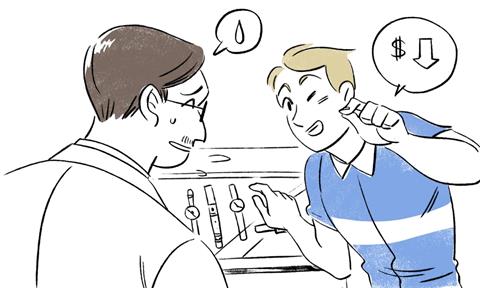In this chapter we’ll learn how to count money, purchase things, and ask for things. We’ll also cover grammar forms for expressing "to" and "from" a person.
Conversation

김철수: 저기요. 이 시계가 얼마입니까?
직원: 삼만구천원입니다.
김철수: 조금 깎아주세요.
직원: 알겠습니다. 그럼 삼만원입니다.
김철수: 조금 더 깎아주세요. 이만오천원은 어떻습니까?
직원: 안 됩니다. 그럼 저에게 이만구천원을 주세요.
김철수: 여기 이만구천원입니다. 감사합니다!
직원: 안녕히 가세요.
김철수: 네, 많이 파세요!
Counting Dollars
In Chapter 12 we learned how to count 원 using Sino-Korean numbers. Now let’s take a quick moment to learn how to count dollars and cents.
불 dollar counter
→ 일불 "1 dollar"
→ 십불 "10 dollars"
→ 만불 "10,000 dollars"
전 penny counter
→ 일전 "1 cent"
→ 십이전 "12 cents"
→ 오십구전 "59 cents"
Dollars and cents are both counted using Sino-Korean numbers. Say the dollar amount, followed directly by the amount of cents.
일불 삼십전
"$1.30"
삼불 이십전
"$3.20"
십불 이전
"$10.02"
백불
"$100"
Note that foreign currencies (such as the dollar) will be written the same way they would be normally – $1.30, for example. In order to say them, you will need to know how to use their counters, 불 and 전.
"Please"
Verb Stem + (으)세요
Let’s learn how to tell someone to do something for you – "please go to the store," or "please do it." We’ve already learned how to use 주세요 to say "please give me." This actually comes from the verb 주다, which means "to give." The ending part, 세요, is used to make the verb a polite command. By polite command, I mean it is similar to asking someone "please."
Take the verb stem and add 으세요 if it ends in a consonant, or add 세요 if it ends in a vowel.
주다 → 주 + 세요
주세요
"Please give me."
하다 → 하 + 세요
하세요
"Please do it."
가다 → 가 + 세요
가세요
"Please go."
들어오다 → 들어오 + 세요
들어오세요.
"Please come in."
찾다 → 찾 + 으세요
찾으세요
"Please look for it."
놓다 → 놓 → 놓 + 으세요
놓으세요
"Please put it down."
For verbs ending in a single ㄹ, remove the ㄹ before doing the above step.
팔다 → 팔 → 파 + 세요
파세요
"Please sell."
Advanced Notes:
This is the same form used in the phrases 안녕히 가세요 and 안녕히 계세요. However, 안녕히 가세요 and 안녕히 계세요 are not polite commands, but are regular questions. This is because this form, (으)세요, has an additional use in speaking politely (specifically, when using what’s called honorific speech). This book doesn’t have room to cover how to use this form in this way, but just know that they are formed the same way.
김철수: 저기요. 이 시계가 얼마입니까?
"Excuse me. How much is this watch?"
"Excuse me!"

As we learned in Chapter 11, 저기 means "there (farther)" and 여기 means "here." However, when using them to call people they have a different usage. You can call out to someone else by saying either 저기요 ("You over there!") or 여기요 ("Hey, I’m over here!"). Only use these words when you need to get an employee’s attention, whether at a restaurant or in a store.
여기요!
저기요!
"Excuse me!"
However, this does not mean "excuse me" when you are apologizing to someone, or recognizing that you may be interrupting someone – perhaps after bumping into a stranger on the street, or when trying to ask directions. For these situations, use the verb 실례하다 ("to do a discourtesy").
실례합니다.
"Excuse me."
실례하지만…
"Excuse me but..."
The above sentence could then be followed by your request.
Advanced Notes:
You might see and hear 실례지만 used as well. This has the same meaning as 실례하지만, but is a more common, quicker way of expressing the same thing.
직원: 삼만구천원입니다.
"It’s 39,000 Won."
김철수: 조금 깎아주세요.
"Please give me a discount."
Advanced Notes:
깎아주다 translates as "to give a discount," but literally it means "to trim down." Figuratively, by saying 깎아주세요 you’re asking the employee to trim down the price.
직원: 알겠습니다. 그럼 삼만원입니다.
"Understood. Well then it is 30,000 Won."
김철수: 조금 더 깎아주세요. 이만오천원은 어떻습니까?
"Please give me a little more of a discount. How is 25,000 Won?"
조금 더 can be used anywhere as an adverb to mean "a little more."
조금 더 주세요.
"Please give me a little more."
조금 더 연습하세요.
"Please practice a little more."
조금 더 노력하세요.
"Please try a little more."
We first saw the verb 어떻다 ("to be how") in Chapter 8 when we learned the adverb 어떻게 ("how"). Then we saw it make another appearance in Chapter 10 when we learned the adjective 어떤 ("what kind of"). Now we’re going to be using it as a regular descriptive verb.
어떻습니까?
"How is it?"
You can use the verb 어떻다 anywhere to ask someone "how" something is.
학교가 어떻습니까?
"How is school?"
그 영화가 어떻습니까?
"How is that movie?"
음식이 어떻습니까?
"How is the food?"
When asking "how" someone is, instead ask 어떻게 지내세요 – "how are you doing?" You can ask this in the same situations as 잘 지내세요, which we learned in Chapter 7.
Q. 어떻게 지내세요?
"How are you doing?"
A. 아주 좋습니다.
"I’m very good."
Advanced Notes:
Using the verb 어떻다 to ask how someone is has a different meaning – it asks about them as a person, or their personality.
친구들이 어떻습니까?
"How are your friends?"
The above could be asked if you were wondering what type of people their friends are. If you are wondering how the friends are doing, instead use 어떻게 지내세요.
친구들이 어떻게 지내세요?
"How are your friends doing?"
Let’s take one more look at the second part of this sentence.
이만오천원은 어떻습니까?
"How is 25,000 Won?"
Remembering what we learned about the Topic Marker in Chapter 15, this sentence would literally translate to "As for 25,000 Won, how is it?"
직원: 안 됩니다. 그럼 저에게 이만구천원을 주세요.
"That won’t work. Well then, give me 29,000 Won."
되다 and 안 되다
되다 and 안 되다 are opposites. In the above sentence, 되다 means "to be okay" and 안 되다 means "to not be okay."
Q. 오늘 학교가 있지만 공원에 가고 싶습니다.
"I have school today, but I want to go to the park."
A. 안 됩니다.
"No."
"That’s not okay."
되다 can also mean "to work," and 안 되다 can mean "to not work."
제 컴퓨터가 안 됩니다.
"My computer doesn’t work."
지금 됩니까?
"Does it work now?"
저의 핸드폰이 안 됩니다.
"My cell phone doesn’t work."
Advanced Notes:
Although 핸드폰 is certainly the most common word for "cell phone," you may also choose to use either 휴대폰 ("mobile phone") or 휴대 전화 ("mobile telephone") instead.
And finally, 되다 can also mean "to become," and 안 되다 can mean "to not become."
왜 선생님이 되고 싶습니까?
"Why do you want to become a teacher."
저는 더 좋은 사람이 되고 싶습니다.
"I want to become a better person."
저는 프로 선수가 되고 싶지 않습니다.
"I don’t want to become a professional athlete."
Most often, as in the examples above, you will see 되다 and 안 되다 used together with the Subject Marker.
To and From a Person
에게 and 에게(서)
We’ve learned how to say "to" and "from" a location (에서…까지), and "to" and "from" a time (부터…까지). Here we’ll learn how to say "to" and "from" a person.
To say "to" someone, attach 에게 after the person.
저에게 주세요.
"Please give it to me."
김 씨에게 편지를 보내고 싶습니다.
"I want to send a letter to Mr. Kim."
김 씨에게 말하세요.
"Speak to Mr. Kim."
Advanced Notes:
Both the verbs 말(을) 하다 and 물어보다 will use 에게, and not the Object Marker, when stating to whom it is you are talking or asking. The same applies to any verb that shows communication, such as 전화(를) 하다.
박 씨에게 물어보세요.
"Ask Mr. Park."
내일 정 씨에게 전화하세요.
"Call Mr. Jeong tomorrow."
김 씨에게 주세요.
"Please give it to Mr. Kim."
To say "from" someone, attach 에게서 after the person.
저에게서 배우고 싶습니까?
"Do you want to learn from me?"
김 씨에게서 받습니다.
"I receive it from Mr. Kim."
However, the 서 in 에게서 is optional. Feel free to simply use 에게 for both "to" and "from" as long as the meaning isn’t completely vague by doing so.
김 씨에게 줍니다.
"I give it to Mr. Kim."
김 씨에게 받습니다.
"I receive it from Mr. Kim."
Advanced Notes:
You can use the same 에게(서) to say "to" and "from" an animal as well.
김철수: 여기 이만구천원입니다. 감사합니다!
"Here is 29,000 Won. Thank you!"
직원: 안녕히 가세요.
"Goodbye."
김철수: 네, 많이 파세요!
"Okay, sell a lot!"
많이 파세요 comes from 많이 팔다 ("to sell a lot"), and is a common phrase you can say to a store employee after purchasing something. This phrase is similar to saying "I hope your business does well."
Practice
Write the following amounts in Korean:
1. $0.10
2. $1.00
3. $1.50
4. $5.25
5. $80.11
6. $1,020.33
Translate to Korean:
7. "Please give me $10."
8. "Please take a shower."
9. "My car does not work."
10. "I want to be a doctor."
11. "Please buy medicine at the pharmacy."
Translate to English:
12. 돈을 조금 더 주세요.
13. 왜 선생님이 되고 싶지 않습니까?
14. 저는 김 씨에게서 한국말을 배웁니다.
15. 한국 음식이 어떻습니까? 맛있습니까?
16. 빨리 숙제하세요.
New Phrases
(조금) 깎아주세요. - "Please give me a discount."
(을/를) 더 주세요. - "Please give me more…"
많이 파세요. - "Sell a lot."
여기요. - "Over here." ("Excuse me.")
저기요. - "Over here." ("Excuse me.")
어떻게 지내세요? - "How are you doing?"
실례합니다. - "Excuse me."
실례하지만… - "Excuse me but…"
New Vocabulary
되다 - "to become," "to be okay," "to work"
안 되다 - "to not become," "to not be okay," "to not work"
들어오다 - "to come in"
들어가다 - "to go in"
실례하다 - "to do a discourtesy"
물어보다 - "to ask"
(대)답 - "answer"
(대)답(을) 하다 - "to answer"
계획 - "plan"
계획(을) 하다 - "to plan"
결정 - "decision"
결정(을) 하다 - "to decide," "to make a decision"
사다 - "to buy"
팔다 - "to sell"
주문(을) 하다 - "to order (something)"
빌리다 - "to borrow," "to lend"
놓다 - "to put down," "to let go"
넣다 - "to put in"
보내다 - "to send"
도와주다 - "to help"
주다 - "to give"
쓰다 - "to use," "to write"
사용하다 - "to utilize," "to use"
나누다 - "to share," "to divide"
샤워(를) 하다 - "to take a shower"
씻다 - "to wash," "to bathe"
세수(를) 하다 - "to wash one’s face and hands," "to wash up"
빨래 - "laundry"
빨래(를) - 하다 "to do the laundry"
설거지 - "(dirty) dishes"
설거지(를) 하다 - "to do the dishes"
쓰레기 - "garbage," "trash"
버리다 - "to throw away"
목표 - "a goal"
부럽다 - "to be jealous"
연습(을) 하다 - "to practice"
노력 - "effort"
노력(을) 하다 - "to try," "to put forth effort"
샴푸 - "shampoo"
칫솔 - "toothbrush"
치약 - "toothpaste"
시계 - "clock," "watch"
편지 - "(written) letter"
메시지 - "message"
쪽지 - "note"
프로 선수 - "professional athlete"
팀 - "team"
껌 - "gum"
씹다 - "to chew"
불 - dollar counter
전 - penny counter
에게 - "to (a person)"
에게(서) - "from (a person)"
조금 더 - "a little more" (adverb)